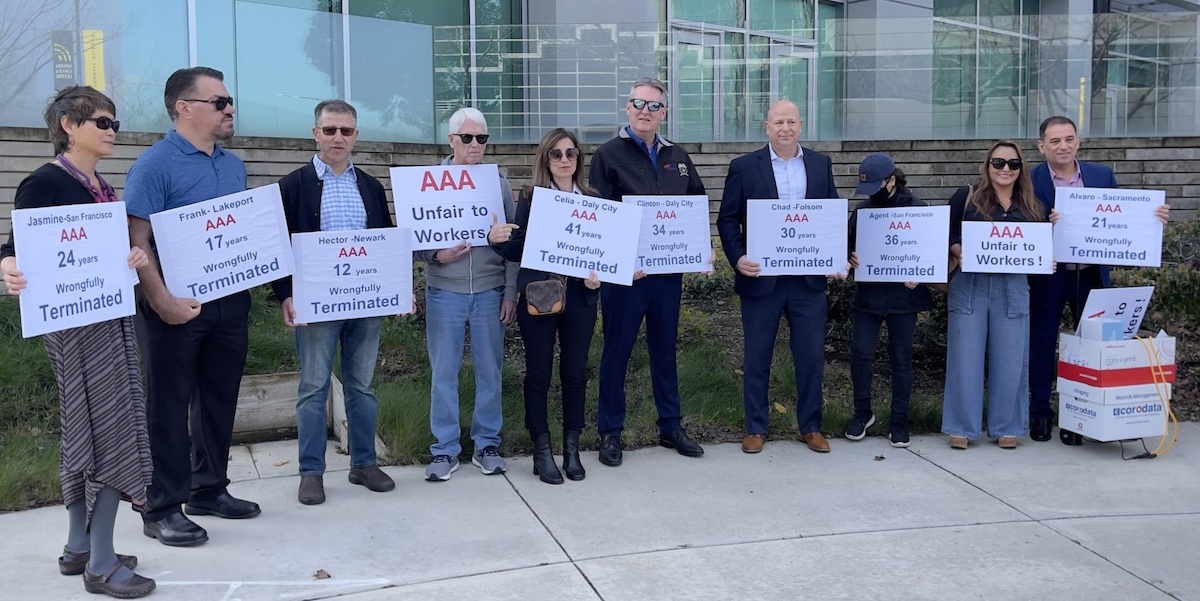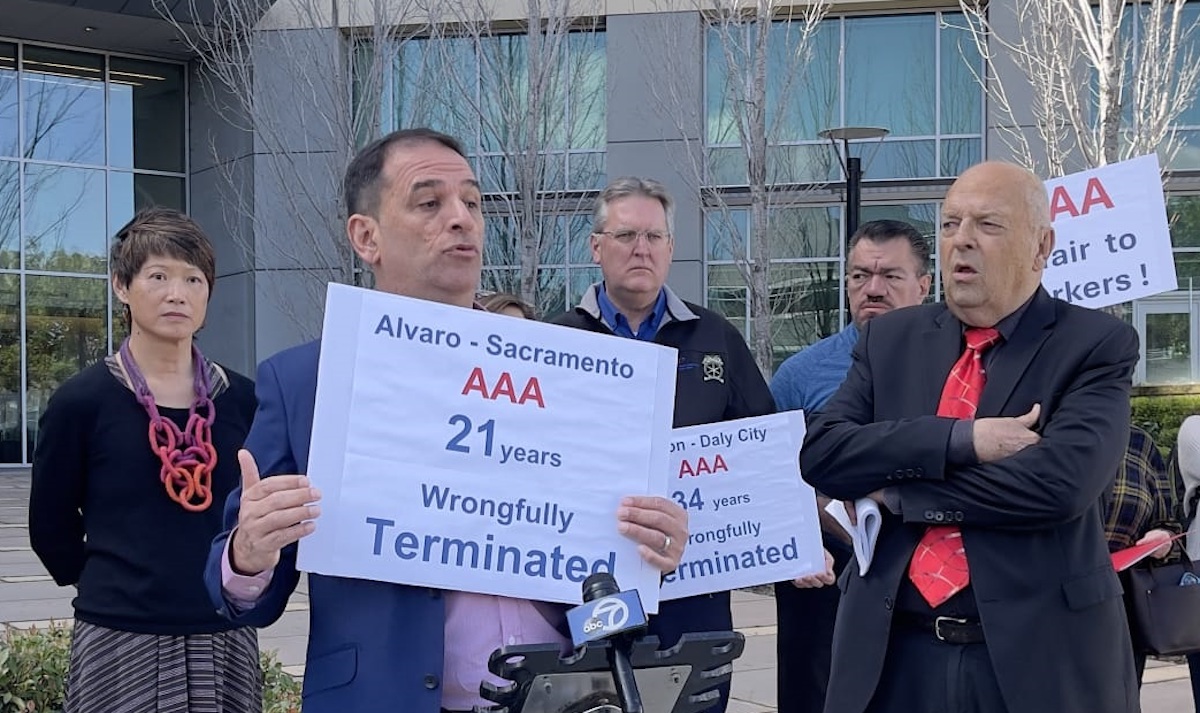About two weeks before AAA terminated Alvaro Perez, the company held a huge office celebration, recognizing his 20 years of exceptional work.
Perez was recognized as a platinum and gold producer with the American Automobile Association of Northern California, Nevada & Utah, as well as being a Top-One Performer Multi-Line Producer in 2020. He was also in the top 59 AAA agents in 2018. He had regularly conducted business with his clients in Spanish and was a designated Spanish-language spokesperson for AAA in the Sacramento area, where he worked in the Natomas branch.
Perez is now part of a discrimination case recently filed by Gary Gwilliam, founding partner at Gwilliam Ivary Chiosso Cavalli & Brewer in Oakland.
According to the complaint, the defendant, the American Automobile Association of Northern California, Nevada & Utah, has a long-standing pattern and practice of terminating older insurance agents and giving favorable treatment to younger agents.

“In our complaint, we allege that AAA systematically targeted and then wrongfully terminated our clients without cause and has done the same thing to scores of other AAA agents as a way to aggressively improve their bottom line at a time of record profits for AAA,” Gwilliam said.
The 10 plaintiffs in the case were — by AAA’s own records — loyal, hard-working and successful commissioned insurance agents. They had consistently received positive performance reviews from their managers and supervisors.
However, in 2014, when Tim Condon was named AAA’s chief executive officer and president, AAA started treating employees over the age of 40 differently. In fact, the complaint alleges that Condon was overheard by sources within the company stating that older agents like the plaintiffs were making “too much money” and that he was “going to manage them out,” or words to that effect.
With these statements, Gwilliam said, the motive for this case of age discrimination is clear — money. At AAA, the earnings of agents over 40 are directly related to their ages. Each of the plaintiffs was making high earnings on renewal commissions, based mainly on a large portfolio (or book) of loyal clients they had built and maintained throughout their long AAA careers. By terminating them, AAA no longer had to pay high commissions on their extensive books of multi-year repeat business and could have the policies serviced by younger, lower-paid employees.
The U.S. Equal Employment Opportunity Commission’s (EEOC) Age Discrimination in Employment Act forbids discrimination because of age, putting workers over 40 in a protected class. Furthermore, in California, under the Fair Employment and Housing Act, it is an unlawful employment practice to discriminate against a person in compensation or in terms, conditions, or privileges of employment because of their age.
Despite these protections, about 453,000 U.S. workers filed age discrimination claims with the EEOC between 1997 and 2020. In 2020 alone, there were 14,183 such claims filed. About 6% of those claims ended in settlements totaling $76.3 million, indicating there is at least some hope for those who file legitimate age discrimination claims.
Meet more of the plaintiffs

At the time of her wrongful termination, 54-year-old Jasmine Fu had been a AAA agent for 23 years. Working in the Lakeshore Plaza branch in San Francisco, Fu received awards for her service and sales, and was even lauded by AAA for her “incredible skill set as a salesperson.” Many of her clients preferred to conduct business in Mandarin. When she was wrongfully terminated, AAA left the two Caucasian, English-only male agents in the branch.
“This whole thing has turned my life upside down,” Fu said. “I’m totally devastated financially and emotionally.”
Hector Luna, 55, had worked for AAA since 2012. In the Newark branch, he regularly conducted business in English and Spanish. Luna consistently exceeded his assigned goals and was recognized by AAA for “delivering business results” while “follow[ing] organizational procedures and guidelines to minimize risk.”
Joseph “Chad” Maduri, 52, had worked his way up the AAA ranks since 1992, most recently as insurance sales agent at the Folsom branch. He was repeatedly recognized by AAA for his sales achievements and “a great depth of knowledge regarding insurance,” allowing “his members [to] benefit from his expertise daily.”
“I was terminated because of my large book of business,” Maduri said. “AAA could save a lot of money by not paying me my renewal commissions. That book of business took me 30 years to develop.”
Over her 40 years at AAA, 60-year-old Celia Solorio had worked her way up from file clerk to policy processor to underwriter, and then to agent at the Daly City branch. With an excellent work record and numerous awards for her service and sales, Solorio had amassed an extensive book of business that included many non-English speakers.
“After giving AAA more than half my life and building my book of business from scratch, they unfairly and illegally terminated me,” said Solorio.
When Clinton Ward, 57, was first hired in 1990, he was told to “stay with AAA,” which “never laid off employees” and that, “the more longevity, the more rewards would come.” Ward prided himself on the extra efforts he made with his special-needs clients and his clients from the Veterans Administration at the AAA branch in Menlo Park.
All plaintiffs were long-time, successful employees of AAA, said their attorney. They were consistently recognized as being top performers by AAA, making them members of AAA’s “Circle of Excellence.”
“Age discrimination in the workplace sometimes shows up as implementing policies that disproportionately impact older workers,” Gwilliam said. “AAA was purposeful in targeting those agents with the largest books of repeat or residual annual renewal business so that AAA could dramatically lower their costs by removing older agents then shifting these AAA clients to younger, lower-paid employees. This is simply wrong. It is illegal. It is age discrimination,” said Gwilliam.
The plaintiffs are seeking a judgment against AAA that will ensure the company establishes and enforces policies and procedures protecting their employees from unlawful discrimination, harassment, and retaliation, as well as financial restitution for lost compensation and punitive damages.
“This is an outrage that this company would terminate these good, long-term employees and ruin their lives,” Gwilliam said. “It’s wrong and we are going to take them to task.”
Fu et al. v AAA has been filed with the Superior Court of California, County of Contra Costa. [Case #C24-00592]


